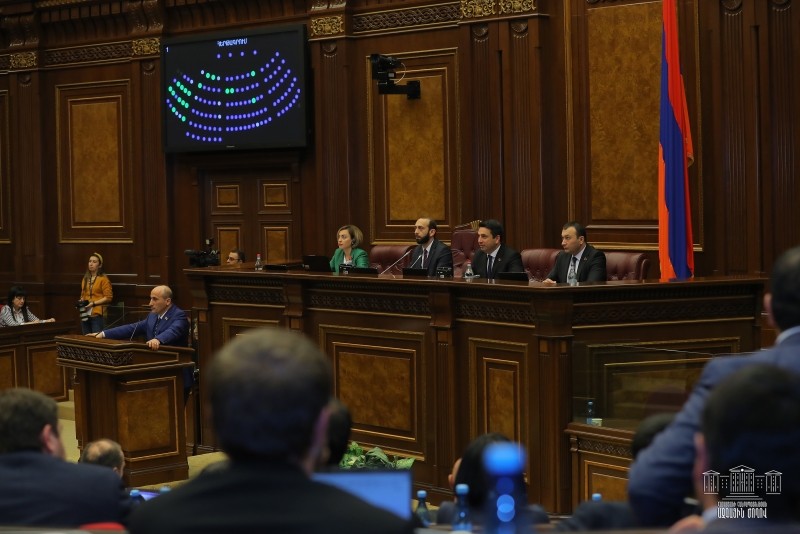
Armenia’s National Assembly has passed a bill calling for a nation-wide referendum on Constitutional Court terms. If the proposed amendments come into force, seven of the nine Constitutional Court judges will be removed.
The bill, co-authored by 37 My Step faction MPs, was put on the floor of the parliament in an extraordinary session on 6 February. On 9 February, the Office of the President announced that President Sarkissian signed a decree setting April 5 as the day of the referendum.
The referendum, if passed, would amend article 213 of Armenia’s constitution, which allows for a grandfather clause for Constitutional Court judges who were appointed prior to April 2018 and allowed them to serve until 65 or 70 years old — depending which constitutional rules (1995 or 2005, respectively) were in force when they were appointed.
Judges appointed after April 2018 serve for a 12 year term limit. If passed, this change would mean that seven of the nine judges would be forced off the court, as they have served for 12 or more years.
This is only the latest development in a long drama between Prime Minister Pashinyan and the country’s highest judicial body. For months the ruling authorities have been trying to force out the members of the Constitutional Court, especially the court’s head Hrayr Tovmasyan. The overwhelming majority of members on the court were appointed before the 2018 revolution that swept Pashinyan to power.
[Read more on OC Media: Head of Constitutional Court threatens to sue Prime Minister]
‘Constitutional Court crisis’
The vote on the referendum bill passed with 88 for, 18 against, and 0 abstentions. Prosperous Armenia, the largest opposition party in the legislature, did not take part in the vote.
During the eight-hour session, a historic 44 MPs took to the floor to either defend or criticize the bill.
My Step MP Vahagn Hovakimyan claimed that the reason that the authorities had taken on this initiative was because of the low confidence the public had toward the Constitutional Court.
‘The public views today CC as the court that for years would confirm all the beatings, abuse, and election fraud, then say, “It’s ok, it’s nothing serious, so they forged the elections a little, but it didn’t affect the results [of the elections].”’
In a later interview with Civilnet, Hovakimyan explained that a referendum is the most constitutional way to solving the ‘Constitutional Court crisis.’
During the hearings, Edmond Marukyan, the head of the opposition Bright Armenia faction, criticized the idea of a referendum considering the fact that the parliament had the power to pass the bill without a referendum.
‘Why are you putting the country through election processes and tribulation?’ he asked. ‘Why are you giving those formerly in power an opportunity to take part in a referendum, take part in political processes and reemerge?’
Prime Minister Nikol Pashinyan also took part in the parliamentary session on 6 February during which he explained the reasoning behind the bill.
‘The Constitutional Court, de facto and de jure, has become an advocate of electoral fraud and illegal power in the Third Republic’, he said. He also addressed CC members and urged them to retire.
‘You can solve [the Constitutional Court] crisis yourselves’, he said.
[Read more on OC Media: Armenian Constitutional Court judges offered early retirement]
Demographic troubles
According to Article 207 of the Constitution, in order for the amendment to pass, more than 50% of voters must vote in favor. The total number of the votes in favor must also be higher than 1/4th, or 25% of all eligible voters.
My Step MP Hamazasp Danielyan told OC Media that the referendum may run into a technical hurdle into meeting the 25% threshold due to a discrepancy between the number of actual voters versus the number of voters in the official voting lists.
‘To date, the practice has been to err in the direction of keeping names on the list unless it has positive confirmation that they have deceased or are no longer eligible to vote’, Harout Manougian, a commentator for EVN Report wrote in a recent article. ‘The current voter list is reported to include the names of many people who have not only moved abroad but also many who have died abroad.’
‘Dangerous precedent’
On 7 February, former Deputy Justice Minister Ruben Melikyan, along with Director of the Armenian Helsinki Committee Avetik Ishkanyan, and former Human Rights Defender of Armenia Larissa Alaverdyan, published an announcement harshly criticizing the February 6 vote for bypassing review by the Constitutional Court.
‘While tools for direct democracy are important to us, however, we believe that they can’t be used arbitrarily and unjustly’, the statement reads. ‘This will not only undermine the foundations of the rule of law, but will also create a dangerous precedent for violating constitutional law.’
On February 9, Constitutional Court member Vahe Grigroyan gave an interview to Azatutyun, explaining why a referendum is necessary.
‘Of course, sending draft constitutional amendments to the Constitutional Court is necessary,’ Grigoryan said. However, he further explained that this is a special case, as ‘no Constitutional Court members can review and give an opinion on their own status and authority’.
‘When I see people in the legal community questioning this, I wonder which lawyers are they?’ said Grigoryan. ‘There is [academic] science behind the fact that a judge can’t review their own case. Students learn this in their freshman year.’
On 9 February, Pashinyan wrote on Facebook that ‘April 5 will be the day we say yes to the revolution, yes to freedom, yes to the future and will slam the door on the corrupt.’
Shortly thereafter he went live on Facebook and urged all Armenian citizens living abroad to book their tickets to Armenia for April 5 to take part in the referendum.









